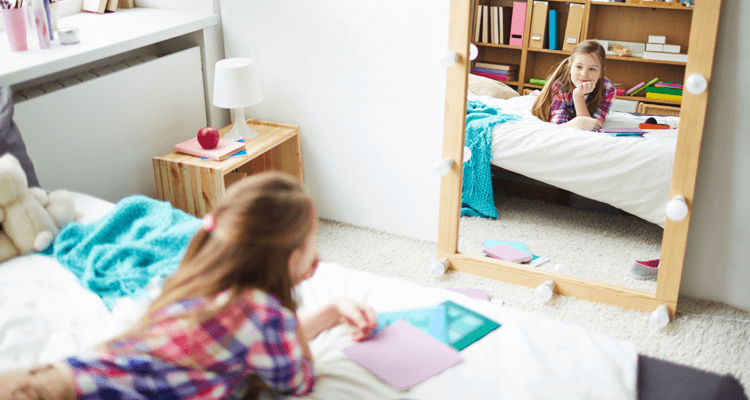Did you know that more than 60 percent of 13- to 17-year-olds have at least one profile on a social networking site, many spending more than two hours per day on social media? And according to survey results, 88 percent of these teens have witnessed someone being mean on social media.
Body beauty advertisements about how to be “perfect” are everywhere. What am I supposed to do? Blindfold my children each time I see a TV commercial, billboard, or image popping up on the computer or screen?
No. I learned a long time ago that I can’t protect my girls from the onslaught of body beliefs. Of course, I want to! Having overcome an eating disorder and become an advocate for recovery, I want to wrap up my girls in a swaddle and make sure I have my eyes on them at all times. But it’s not as easy as you might think to swaddle preteens.
I don’t need to tell you about the downfalls of social media. Let’s be honest—our children relate and socialize in a totally different way than we once did (Donkey Kong anyone?). And, as I said, I can’t be with my girls everywhere at all times. But I do something way better! I can support my girls in creating a healthy relationship with their bodies, so that the impact of others’ negative body image can roll off backs that are perfectly their own, without the burden of skewed expectations of perfection.
Here’s how I do it:
-
- I am a body-image role model. I treat my body the way I want my children to treat theirs. I have compassion for my lumps and bumps and the aging process. I never comment on my body negatively.
-
- I don’t dismiss my children’s desire to feel good about the way they look. If only we could all feel comfortable in our bodies! But many of us say things like, “Your hair looking pretty is not important!” to our children, as if it shouldn’t matter to them. But it does. I honor my girls’ desire to feel good. But I also consistently and gently introduce other ways they can feel good about themselves beyond their bodies such as by exploring their creativity, personality, and the unique gifts and talents they bring to this world.
- I broaden my definition of beautiful. I ask my children what beautiful means to them. Then I make a list. I start by asking these questions: What is your favorite color? What is your favorite hobby? What is something you like about someone the most (make sure it’s not a physical trait)? Then I ask them to write the answers down and post them on their bedroom wall—now that’s beautiful!
Projecting my own fears will not prevent my children from suffering—it simply ignites fear in them, too. I remind myself that instead of worrying about all the things that come at our children from outside of our home—through avenues like social media and bullying, I say, let’s change what we actually have the power to change. Let’s instead make changes inside our home that equip our children with skills by possessing those skills ourselves.
For additional information about Eating Recovery Center, call 877.789.5758, email info@eatingrecoverycenter.com, or visit eatingrecoverycenter.com to speak with a masters-level clinician.





























































































